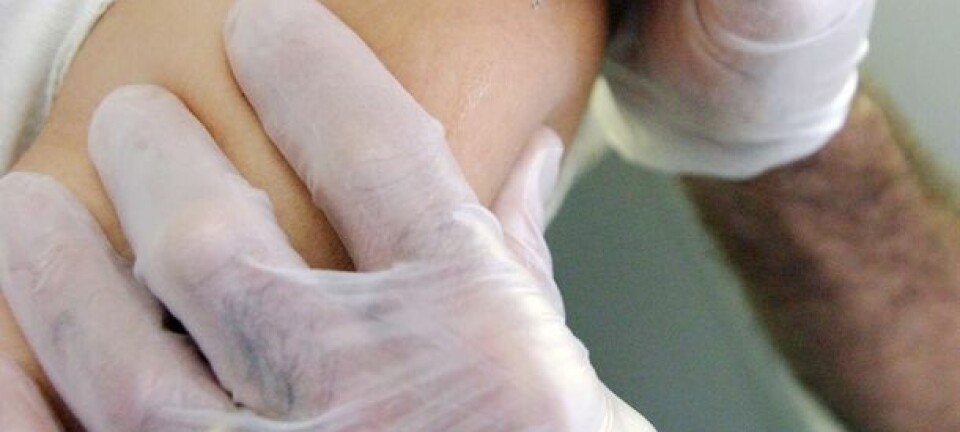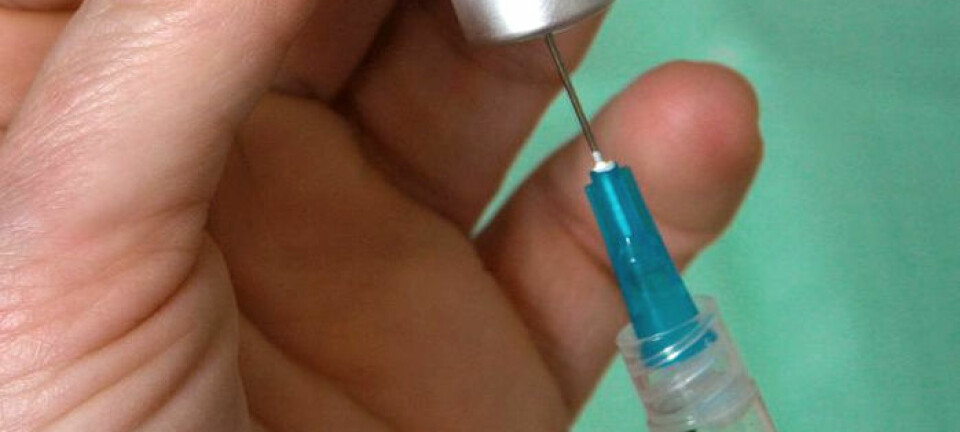
Breakthrough: why MMR vaccine can give children febrile seizures
The highly debated MMR vaccine which protects against measles, mumps and rubella, can give children febrile seizures. Danish scientists have now discovered why this happens to some children.
Some children suffer from febrile seizures a few weeks after receiving the important MMR vaccine causing loss of consciousness and stiffening of the limps.
This happens to one or two in a thousand children and can be an traumatic experience for both child and parents. It has also causes many parents to doubt the safety of vaccination.
A new Danish study shows that it is no coincidence which children experience this dramatic side effect. The study was recently published in the scientific journal Nature Genetics and shows that small variations in the genes are responsible.
"When it comes to public health it's enormously important for people to have faith in medicines. Therefore, it is extremely important that we can find the reasons why some people experience serious side effects,” says one of the authors, Bjarke Feenstra, senior researcher at Statens Serum Institut.
He believes, that the new knowledge can contribute to better vaccines in the future and more public trust.
Extremely important study, says colleague
Professor of experimental biology, Allan Randrup Thomsen from the Department of International Health, Immunology and Microbiology at the University of Copenhagen, was not involved in the new study, but has read it and is extremely impressed.
Also, Thomsen entirely agrees with Feenstra that the result is important when it comes to growing scepticism about vaccines.
"This study is extremely important at a time when a lot of people are sceptical about vaccination. It’s great that we can tell people exactly what's happening and why," says Randrup Thomsen.
Neither Randrup Thomsen nor Feenstra believe it would be relevant to gene-test children and refrain from giving the MMR vaccine to children with specific genetic profiles.
"It's estimated that the MMR vaccine saves about 1,000,000 lives a year, so the disadvantages of using the vaccine distinctly outweighs the extremely rare side effects," says Feenstra.
Only possible in Denmark
In the study, the Danish scientists examined the genes of nearly every Danish child that has experienced febrile seizures over the past 20 years.
The compared data from the Danish National Patient Register, which records all hospital admissions with the the Vaccinations Register, which records all vaccinations, and the genetic profiles of all children affected by febrile seizures on the basis of samples from the National Biobank.
The scientists then analysed blood from Danish children which is obtained from their heel just after birth. These blood samples are stored at the biobank.
In this way the scientists could work out which children had experienced febrile seizures two weeks after their MMR vaccination, as well as these children's genetic profiles.
"This opportunity is unique to Denmark. Because we are able to combine the information from three registered, we are undoubtedly the only country in the world where you can do this kind of study,” says Mads Melby, who was also involved in the study.
Genes are responsible for febrile seizures
In their study the researchers examined three groups:
- Children who experienced febrile seizures two weeks after vaccination (1300 children).
- Children who experienced febrile seizures independently of vaccination (2000 children).
- A control group which had not experienced febrile seizures (5800 children).
The results of the studies show variations in two regions of the genome where the variations correlate with an increased risk of febrile seizure after vaccination.
Variation in the immune system
The scientists have discovered that the two regions of the genome, which are associated with an increased risk of experiencing febrile seizures after vaccination, are involved in the functionality of the immune system.
One of the genes actually functions as a receptor for the measles virus. It is here the measles virus binds itself to the DNA.
"It makes good sense, biologically, that variations in the genes associated with the immune system influence children's reaction to the MMR vaccine, because the purpose of the vaccine is to strengthen the immune system,” says Feenstra.
Variations in genes code for epilepsy
The scientists found two of the genetic variations to be related to ion channels in the cells' membranes.
According to Feenstra, this also makes good sense, because more rare mutations of these genes have been found in people with epilepsy.
“It is a hint to understanding why febrile seizures are associated with specific genes. Here, it is perhaps a case of febrile seizures being a less serious effect of common DNA variations in a gene, whereas more rare and serious mutations result in a more serious illness, namely epilepsy," says Feenstra.
Experiments on rats' brains supported the study
The scientists found the third of the four mutations in a region of the genome which is associated with regulation of magnesium in the blood. Previous studies in animals have shown that lack of magnesium in the blood can give seizures. Again the scientists agree, that this observation makes perfect sense in terms of biology.
The final mutation, which the scientists found, has previously been observed in rats. Here, it has been found that rats lacking this gene are more sensitive to pain and their brains are more easily over-stimulated, when exposed to heat.
"It's wonderful to be able to supplement our genetic findings with previous data and experiments. In all cases, it makes good sense that variations in these regions of the genome lead to an increase of risk. We still lack quite a lot of understanding of the mechanisms, but we're working on it," says Feenstra.
---------------
Read the original story in Danish on Videnskab.dk
Translated by: Hugh Matthews












